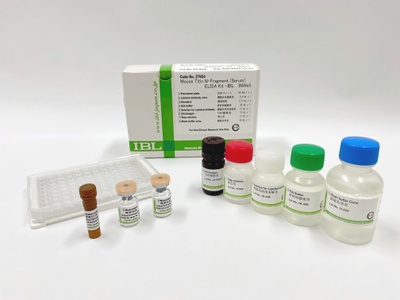- HOME >
- For Researchers >
- Product Search >
- Search Result >
- #10423 Anti-Titin-N (53A1) Mouse IgG MoAb
Product Search
#10423 Anti-Titin-N (53A1) Mouse IgG MoAb
- Intended Use:
- Research reagents
- Application:
- ELISA
- Package Size1:
- 100 μg
- Note on Application Abbreviations
- ELISA:Enzyme-Linked ImmunoSorbent Assay
※ The product indicated as "Research reagents" in the column Intended Use cannot be used
for diagnostic nor any medical purpose.
※ The datasheet listed on this page is sample only. Please refer to the datasheet
enclosed in the product purchased before use.
Product Overview
Product Overview
| Product Code | 10423 |
|---|---|
| Product Name | Anti-Titin-N (53A1) Mouse IgG MoAb |
| Maker Name | Immuno-Biological Laboratories Co., Ltd. |
| Intended Use | Research reagents |
| Application | ELISA |
| Species | Human |
| Immunizing antigen | Recombinant Titin (1-200) |
| Source | Mouse-Mouse hybridoma (X63-Ag8.653×BALB/c mouse spleen cells) |
| Clone Name | 53A1 |
| Subclass | IgG1 |
| Purification Method | Affinity purified with ProteinA |
| Specificity | Human Titin N-Fragment specific |
| Package Form | Lyophilized product from in Dulbecco's-PBS |
| Storage Condition | 2 - 8 ℃ |
| Poisonous and Deleterious Substances | Not Applicable |
| Cartagena | Not Applicable |
| Package Size 1 | 100 μg |
| Remarks1 | The commercial use of products without our permission is prohibited. Please make sure to contact us and obtain permission. |
Product Description
Product Description
Titin (connectin) is a protein that consists of 34,350 amino-acid and specifically expresses in a cross-striated muscle. The molecular weight of human titin is 3,816 kDa and it has been known that as the largest protein among of existing proteins in a living body.It is one of sarcomere structured protein that is a minimum unit of myofibrillary protein and it has a role as an elastic protein for recovering the length of shortened sarcomere by its contraction. It has been known that titin is cleaved by proteolytic enzymes such as calpain and matrix metalloprotease if muscles are damaged. Titin N-Fragment, one of these fragments, is 26kDa N-terminus fragments which is excreted into the urine. It has been researched in the field of muscular dystrophy, sports medicine, cardiac disease, NAFLD, sarcopenia and frailty and it is considered as a molecule reflects status of muscles. This antibody can be used for ELISA to detect human urinary Titin N-Fragment.


























